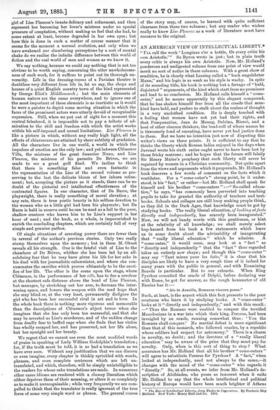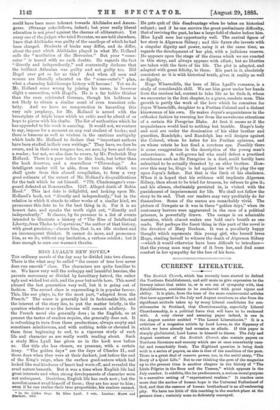AN AMERICAN VIEW OF INTELLECTUAL LIBERTY.* " I'LL call the
work ' Longinus o'er a bottle, Or every critic his own Aristotle." So Byron wrote in jest; bat in plain truth every critic is always his own Aristotle. Now, Mr. Holland's ponderous and undigested volume from one point of view would merit no sort of notice in these columns. With a great show of erudition, he is clearly what Lesaing called a " hoch nngelehrter Mann," and his logic is as weak as his style is washy. In spite of its sounding title, his book is nothing but a farrago of "bald, disjointed " arguments, of the kind which start from no premisses and lead to no conclusion. Mr. Holland calls himself a "come- outer," and he means apparently by this elegant compound, that he has shaken himself free from all the creeds that man- kind have held, and prefers to stalk about the realms of thought in a very unclothed condition. He is deeply touched with a feeling that women have not yet had their rights, and that Pomponatius, Jean de Menng, Delcino, Rienzi, and a host of other obscure thinkers, the bead-roll of whose names he is tiresomely fond of repeating, have never yet had justice done to them. But we have no intention just now of disputing this writer's views on these points. It is sufficient to say that he thinks the liberty which Roman ladies enjoyed in the days when Juvenal wrote his sixth satire ought never to have been lost by those frisky matrons ; and he hopes that the future will falsify Sir Henry Maine's prophecy that such liberty will never be regained by women in a Christian community. But quite apart from the views and arguments which it propounds, Mr. Holland's book deserves a few words of comment on the facts which it ventilates. For a " come-outer's " strong point, be it under- stood, is his "fact," or rather—but Mr. Holland shall speak for himself and his brother " come-outers " :—" So-called educa- tion," he says, "has commonly been perverted into teaching pupils to take for granted the authority of teachers and text- books. Schools and colleges are still busy making people think, as they did in the Dark Ages, that knowledge must be got by studying books. The really liberal education, of looking at facts directly and independently, has scarcely been inaugurated." Now, we will not bandy words with this gentleman, or hint at the relativity of all knowledge ; we shall merely select hap-hazard from his book a few statements which leave us in some doubt about the advisability of inaugurating that " really liberal education " which he admires. A "come•outer," it would seem, may look at a " fact " so "directly and independently" that the "fact" thus regarded takes an entirely new shape ; and though this " come-onter " may say "Tent mienx pour les faits," it is clear that his disciples are likely to have a very rough time of it indeed for many years with the public in general, and with Examining Boards in particular. But to our extracts. When King Pyrrhus consulted the oracle of Delphi, before declaring war with Rome, he got for answer, as the rough hexameter of old Ennius has it :—
" Aio to Aeacida, }lamellas vincere posse."
Such, at least, is the aspect which this fact presents to the poor creatures who learn it by studying books. A " come-outer " looks at it "directly and independently," and with this result: —" Thus the Romans were enabled to conquer the terrified Macedonians in a war into which their king, Perseus, had been inveigled by an oracle, running somewhat thus : ' You the Romans shall conquer.' No martial defeat is more significant than that of this monarch, who followed oracles, by a republic whose soldiers had respect for astronomy." There is a charm in novelty, no doubt; and the devotees of a " really liberal education" may be aware of the price that they must pay for novelty. Only, when is this sort of thing to stop ? What assurance has Mr. Holland that all his brother " come-outers " will agree to substitute Perseus for Pyrrhus P A " fact," when looked at independently, need not always be the same,—it changes with the mood of the " come-outer " who regards it " directly." So, at all events, we infer from Mr. Holland's de- scription of Alcibiades, who poses as innocent when it suits Mr. Holland to say that the whole intellectual and political history of Europe would have been much brighter if Athens • The Mae of Intellectual Liberty. from Tholes to Copernicus. By Frederic May force of some very simple word or phrase. The general course Holland. New York : Henry Holt and Co. 1 3. could have been more tolerant towards Alcibiades and Anaxe, gores. (Strange yoke-fellows, indeed; but your really liberal education is not proof against the charms of- alliteration). Yet every one of the judges who tried Socrates, we are told elsewhere, knew that Alcibiades was guilty of the sacrilege of which he had been charged. Students of books may differ, and do differ, about the part which Alcibiades played in what Mr. Holland calls the "mutilation of the Mercuries." But your "come- outer " is teased with no such doubts. He regards the fact " directly and independently," and contentedly declares that the brilliant Athenian was guilty and not guilty too. Did Hegel ever get so far as this P And when all men and women are liberally educated on the " come-onter's " plan, what a charming kaleidoscope history will become ! Yet we do Mr. Holland some wrong by joining his name, in however slight a connection, with Hegel's. He is a far bolder thinker than the once celebrated German, though his boldness is not likely to obtain a similar meed of even transient cele- brity. And we have no compunction in hazarding this very safe prophecy, for Mr. Holland is armed with the breastplate of triple brass which no critic need be afraid of or hope to pierce with his shafts. The list of authorities which he has appended to his work is amazing. It would not, we venture to say, impose for a moment on any real student of books ; and there is humour as well as wisdom in the cautions ambiguity which leads Mr. Holland to declare that "important authors have been studied in their own writings." They have, we dare be sworn, and in their own tongues too, ere now, by here and there a reader ; but not, we also dare be sworn, by Mr. Frederick May Holland. There is a poor index to this book, but better than the book deserves, and a marvellous " Chronology." An intelligent reader will be able, from two dates which we shall quote from this absurd compilation, to form a very good estimate of the extent of Mr. Holland's disqualifications for the task which he set himself. " 778. Charlemagne's rear- guard defeated at Roncesvalles. 1247. Alleged death of Robin Hood." This last date is delightful, and looking upon Mr. Holland's book, not " directly and independently," but in the relation in which it stands to other works of a similar kind, we pronounce this date to be the best thing in it. For it is an honest date, and speaks the truth right out, " directly and independently." It classes, by its presence in a list of events intended to illustrate a history of "The Rise of Intellectual Liberty, from Thales to Copernicus," the author of that history, with great precision,—classes him, that is, an idle student and an inconsequent thinker. It cannot do more, and pronounce him, as we do, without any hesitation, a verbose sciolist ; but it does enough to earn our warmest thanks.



































 Previous page
Previous page